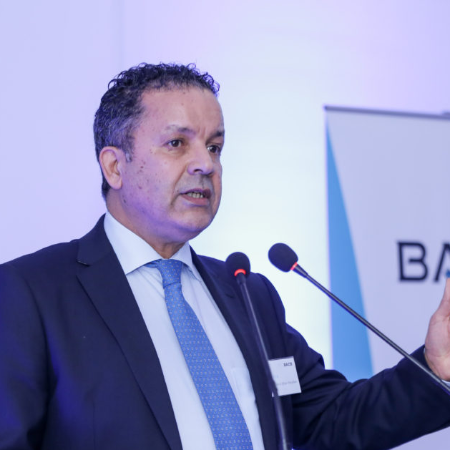Emerging from the pandemic, Francophone Africa seeks a global future
Most African economies have so far succeeded in navigating a year beset with economic challenges. Nabil Frik, Managing Director for Africa and the Middle East at British Arab Commercial Bank (BACB), discusses why Francophone Africa has beaten expectations, as it considers the future of its relationships with global trade partners.

The coronavirus pandemic has caused unprecedented economic disruption across the globe, impacting both economic life and public health. But even as the Francophone governments of Africa introduced measures to mitigate the outbreak, the economies of the region have proven more resilient to the effects of the pandemic than expected.
Francophone Africa – encompassing 29 countries across the continent – includes some of Africa’s fastest growing economies. As the region works towards a post-pandemic recovery, its relationship with the rest of the world is also undergoing a profound shift. Francophone Africa’s long-standing economic reliance on former colonial power France is being replaced by a more multi-polar relationship with other regions, leaving it in control of its own destiny.
Economic resilience amid turbulent times
The region’s remarkable tenacity is attributable to several factors, including the size of the informal economy and its trade weighting towards the export of strategic goods such as oil and cotton. The pandemic has certainly left its mark on trade, although most of the impact has been indirect – with exports markets in Europe and Asia disrupted more than intra-regional trade.
Certainly, local economies are faring a lot better than their key European and North American export markets. Burkina Faso, for instance, is forecast to record 3.2% growth for 2020, a strong result even if somewhat below the 6% anticipated pre-pandemic figure.
The transition to remote working brought about by COVID-19 has added to a complex risk environment, however. In the early days of the pandemic, African banks were unsure whether remote working would guarantee smooth operations – the dominant area of trade finance is a complex undertaking after all. Courier services stopped operating in certain areas, impeding the efficient delivery of key documents. But local infrastructure withstood the additional pressure and African financial institutions have demonstrated that they are more than equal to the task of maintaining crucial trade flows in and out of the region. Risk appetites remained strong, which also bodes well for Francophone Africa’s economic recovery.
As a specialist dedicated to trade finance, BACB has helped support these vital trade corridors throughout the coronavirus crisis. Letter of credit discounting has played a key role, serving as an indispensable tool for unlocking traders’ working capital to finance operations amid uncertain times.
Rewriting the region’s relationship with the rest of the world
While the pandemic may well prompt the re-mapping of global supply chains, Francophone Africa had already been in the midst of a realignment in its relationships with global trading partners. France, the region’s traditional trading partner, has seen its total share of exports to the continent half over the past two decades. In 2017, the one-time colonial power and erstwhile dominant trade partner accounted for just 9.1% of globally sourced imports into Francophone African countries.
The region is also taking concrete steps to pivot away from its traditional partner through currency reform. The CFA franc, used by former French colonies in West and Central Africa, was relatively competitive when pegged to the French franc. The transition to the euro, however, has made the CFA franc more expensive, which has had detrimental effects on the region’s exports.
The Economic Community of West African States (ECOWAS) has long pushed for the introduction of a new currency – the eco – to replace the CFA franc, both as a symbolic political assertion of regional identity and to acquire more economic independence. However, its launch, scheduled for this year, stalled amid the eco’s confused relationship with similar and overlapping initiatives for regional economic unity. Additionally, some ECOWAS members have been unable to meet the convergence criteria for launching the single currency – including meeting inflation targets, debt-to-GDP ratios, and budget deficits. It has also proved difficult, so far, to integrate English speaking neighbours such as Nigeria and Ghana into the broader efforts for currency union.
France’s shrinking role in the region is in large part due to Francophone Africa developing a multi-polar mix of international trade relationships. As seen with other developing areas, China has become the dominant partner, accounting for almost 25% of imports into the region. Trade between China and Africa as a whole fell by 10.6% in 2020 amid the pandemic, but this is widely expected to rebound next year as trade in commodities recovers.
Yet there are plenty of opportunities for others to increase their presence in the region. The wider European Union (EU) is interested in expanding exports to Africa, and has invested in a strong bilateral relationship with its African Union (AU) counterpart. The AU-EU Summit, which was scheduled for this year but is now postponed to 2021, will play host to pivotal discussions on sustainable trade and digitalisation. The UK also regards Africa as a key strategic option as it looks to negotiate new global trade agreements in the wake of Brexit. Indeed, Prime Minister Boris Johnson on Monday called for Britain to become Africa’s "investment partner of choice" at the UK-Africa Investment Summit held in January.
An African approach to self-reliance
While the fast-growing economies of Francophone Africa have a wealth of trade partners to choose from, the larger trends point towards the region leaving behind any residual ex-colonial ties altogether. Intra-regional trade is seen as the path to prosperity for Africa, not least because the pandemic has demonstrated that a heavily outward-looking economy is more vulnerable to global shocks, and that vast globalised supply chains are less resilient than a local or regional arrangement.
Intra-African trade therefore provides tremendous opportunity. The African Continental Free Trade Agreement, signed in 2019, marked a significant milestone – potentially creating the largest free trade zone (by area) in the world. While its implementation has been pushed back due to the pandemic, the Agreement indicates that increased regional collaboration will be key for sustainable economic growth for Francophone Africa’s economies.
Undoubtedly, an intra-African approach would greatly increase efficiency by streamlining trade flows. It is no longer efficient for, say, Cameroon to receive oil imports from Algeria via a company in Switzerland, when it could trade directly with Algeria itself. Indeed, trade corridors are emerging between North and Sub-Saharan Africa. Of course, African unity faces a number of issues including concerns over the free circulation of people and capital. Yet the success of a robust free trade area will have a transformative impact on Africa as a whole, and there is little doubt that strong progress is being made. Specialist international banks, with strong networks and deep local knowledge, will certainly play a crucial role as Francophone Africa looks both further afield and closer to home for new opportunities.





